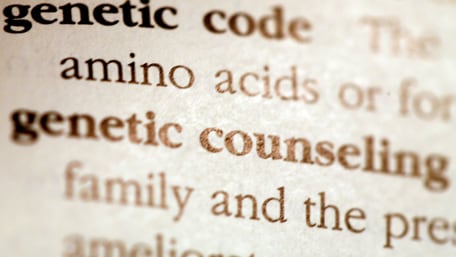Genetic Counseling for Lynch Syndrome
Understanding and dealing with your own or family members’ colorectal cancer can be challenging. Genetic counseling can help by providing information, resources, and support for you and your family. Genetic counseling can help you better understand your likelihood of getting cancer and make an informed decision about what genetic testing option is best for you.
A genetic counselor or other health care provider with specialty training in cancer genetics can provide genetic counseling. Often getting counseling for Lynch syndrome is covered by insurance companies, but not always. Risk information obtained through genetic testing could potentially impact your insurance eligibility. A law called the Genetic Information Nondiscrimination Act prevents employers and health insurers for discriminating against people based on genetic test results. However, life insurance, disability insurance, and long term care insurance are not included under this law.
Your doctor may refer you for genetic counseling if you have
- Already had colorectal cancer
- After surgery to remove colorectal cancer, tumor tissue samples are often screened to see if the tumor could have been caused by Lynch syndrome.
- In some cases, additional testing is needed to know for sure if the cancer was caused by Lynch syndrome.
- A family member diagnosed with Lynch syndrome
- Genetic counseling is recommended to see if testing for the Lynch syndrome mutation that runs in your family is right for you.
- A family history of colorectal cancer
- Your doctor may recommend genetic counseling to see if the cancers in your family are caused by Lynch syndrome, especially if members of your family were diagnosed with colorectal cancer before age 50.
- The first person tested in your family should be someone who has had colorectal cancer, if possible.
- Do you have an increased risk for colorectal cancer because of your family health history?
- What is the chance you have a Lynch syndrome gene mutation?
- Could the colorectal, or other cancers that runs in your family be due to mutations in genes other than the Lynch syndrome genes?
- If you have Lynch syndrome, or another hereditary cancer syndrome, how likely are you to get cancer?
- How will the results of genetic testing for colorectal cancer affect your family members?
- Who in your family should be the first to have genetic testing for Lynch syndrome?
- What are the possible results of genetic testing for Lynch syndrome and what do the results mean?
- What are the potential risks and limitations of genetic testing for Lynch syndrome?
- How will knowing you have Lynch syndrome help you lower your risks for cancer?
- If you have already had colorectal or other cancers, how will knowing if you have Lynch syndrome affect your treatment plan?
- If you have previously been treated for colorectal cancer, what are the chances you will get cancer again?
Following genetic counseling, you can decide whether you would like to have genetic testing done. If you decide to have genetic testing, additional genetic counseling following the testing can help you better understand your test results. The genetic counselor will be available to answer any questions you have regarding your results and your medical options.
